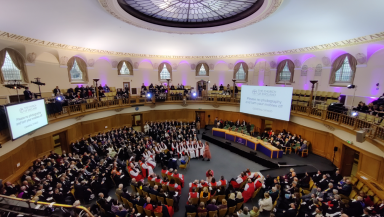
Members of the Church of England's parliamentary body, General Synod, are convening to consider prayers of blessing for same-sex couples.
Plans to introduce Prayers of Love and Faith (PLF) were approved by the February meeting of Synod, which also agreed that new pastoral guidance should be introduced.
The House of Bishops has been working since the February Synod on how these prayers should be implemented and will update this week's meeting.
The majority of the House of Bishops has commended the Prayers of Love and Faith with the exception of 11 dissenting bishops, among them the Bishop of Blackburn, Philip North, the Bishop of Lancaster, Jill Duff, the Bishop of Chichester, Martin Warner, and the Bishop of Sheffield, Pete Wilcox.
Ahead of the November Synod, there have been calls for the Archbishop of Canterbury, Justin Welby, to step down over his handling of disagreements around PLF.
In October the House of Bishops voted to delay the implementation of standalone PLF services until 2025, when they will require a two-thirds majority. However, the bishops said that clergy would soon be able to use the new liturgy as part of existing services.
In an address to Synod at the start of the November group of sessions, the Archbishop of York, Stephen Cottrell, said he wanted legal protection for priests who wish to use the prayers.
"There will need to be some sort of provision. But just as the way forward that is being proposed is pastoral, and in my view does not mean a change in the Church of England's doctrine of Holy Matrimony, so I believe the reassurance and provision that we need should be pastoral," he said.
"This is why I will be supporting the amendment being put forward by the Bishop of Oxford because, as things stand, I am concerned that clergy using the commended prayers might find themselves vulnerable to a legal challenge if their use of the prayers looks to someone else to be a standalone service.
"Something that allows standalone services for an experimental period seems to me to be a sensible and pastoral way forward. It gives clergy and parishes who want to use the Prayers of Love and Faith the legal protection they need.
"And because this will be on an opt-in basis, clergy and parishes who in good conscience won't use the prayers will be under no compunction or compulsion so to do, nor will they be disadvantaged in any way by their decision."













